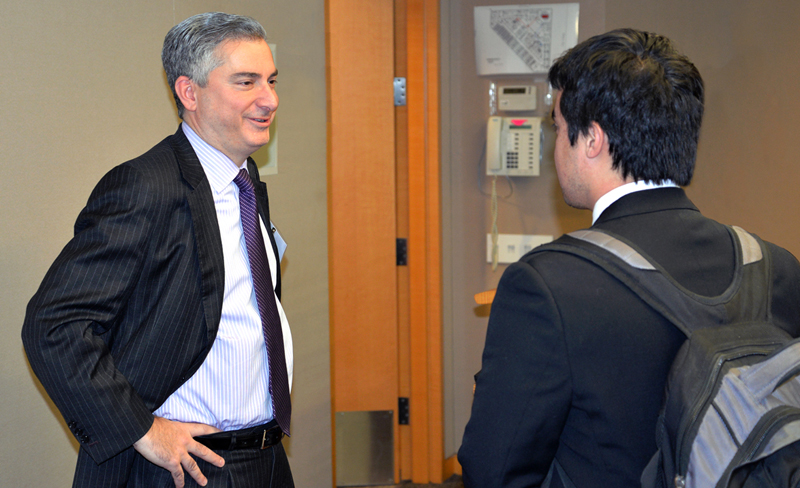Alumni engage pre-law students in winter class
Harpur scholars get to 'test the waters' of legal fields

Inside and outside of the courtroom, legal professionals know the value of one’s reputation.
“Your reputation is everything,” said Shareema Abel ’96. “At the end of the day, all you have is your character and your reputation—and always protect that. And never let anyone convince you to do something that’s out of your character that will tarnish your reputation.”
Abel, special counsel for ethics, risk and compliance for New York State Homes and Community Renewal, was one of the speakers for the winter course, “Current Issues in Legal Practice.” The class is coordinated by the Harpur College dean’s office with the lectures taught by nine prominent law alumni.
Abel appeared before a room of 21 students on Jan. 9 in the Norton Rose Fulbright US LLP building for one of four days that the class takes place in Manhattan.
The first three days consisted of alumni speakers from different law professions. On the fourth night, the students attended Metro Connections Night at the New York Marriott East Side, where they were able to network with alumni from a variety of professional backgrounds.
“It’s really nice that [the syllabus] is so packed in,” said Hanna Dula, a junior majoring in political science. “You basically get to test the waters of all of these legal fields.”
During the lectures, the speakers also present on relevant aspects of the law. Abel presented on the Fourth Amendment and asked students to imagine various scenarios to discuss the legal proceedings with stops, frisks, searches and the existence of probable cause. For Dula, this was relevant to her own legal pursuits.
“I’m interested in constitutional law and when I heard that someone was going to be talking about the Fourth Amendment, I [thought], ‘Yes, I can’t wait.’ I didn’t realize that there’s so many complexities and so many other parts of the law that get drawn in that are also really interesting to me,” she said. “I still want to do constitutional law; it just really opened my eyes so I’m glad for it.”
Abel also took questions from the audience and discussed her own career.
“I wanted to be a criminal attorney for so long,” Abel said. “I loved being able to walk in a courtroom, and people, merely by seeing a brown girl, they feel like, ‘maybe I’ll get some measure of justice,’ because there are not a lot of prosecutors of color.”
On Jan. 9, they also heard from Lillian Wan ’97, a Kings County family-court judge, and the course host, Frank S. Vellucci ’94, partner at Norton Rose Fulbright US LLP.
Wan began her lecture referencing the importance of reputation as Abel brought up.
“It really is important to treat everybody with respect. You can be a zealous advocate for your client without being a jerk,” she said. “The legal community and the legal profession is a small one and even in New York. Your reputation is all you have, it precedes you.”
During the lecture, Wan shared her experiences with cases involving parents and children. As a judge, sometimes she makes minor changes, but they can make all the difference in their lives. She gave the example of ordering for a child to get glasses because the parents neglected to go to the eye doctor.
“They’ve never had glasses in their parents’ house,” she said. “So it’s small things like that that I have control over, and little things that I can order which seem small, but they’re really huge in a child’s life.”
But most of her work involves emotional situations that determine whether or not families stay together for the children’s welfare.
“Even when I issue my decision, I don’t know if this is ultimately the best thing and it could fall apart,” she said. “I try to do my best with all the evidence I have. I can’t predict what’s going to happen with family dynamics—it’s very difficult.”
Vellucci ended the Jan. 9 class with a lesson on venture capital due to his frequent dealings as a transactional lawyer. While his law specialty deals with financing corporate laws, he related his lesson to negotiations in everyday life.
He also shared inspirational advice for the students to consider.
“I don’t know if you’re millennials, but you guys get a bad reputation because many people think millennials are too passive in their careers and in their lives,” he said. “Your career isn’t something that someone else tells you what it should be. You have to make it work for you.”
By the end of the second day, Carlotta Kane, a junior majoring in graphic design, felt more confident in deciding to study law after college.
“Seeing their paths from undergrad at Binghamton University to law school to the real world, they take these winding paths and I feel like it’s giving me more reassurance that I can explore different things and still end up in a good place,” Kane said. “If you aren’t positive that this is what you want to do, by the end of the three days of lectures, you will absolutely know.”
As a Binghamton University alumnus, Vellucci sponsors a scholarship for law school that he described as more of a mentorship for students pursuing a career in law.
While the cost to go to law school is an important factor in the decision-making process, Vellucci said that if being a lawyer is really what they want out of life, then it’s worth the investment.
“Don’t be passive,” Vellucci said. “You want to be passionate about what you do, whichever career you choose.”

